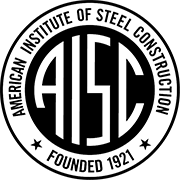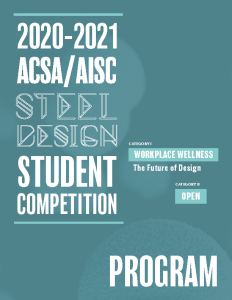Competition Overview
The Association of Collegiate Schools of Architecture (ACSA) is pleased to announce the 21st Annual Steel Design Student Competition for the 2020-2021 academic year. Administered by the Association of Collegiate Schools of Architecture (ACSA) and sponsored by the American Institute of Steel Construction (AISC), the program is intended to challenge undergraduate and graduate students, working individually or in teams, to explore a variety of design issues related to the use of steel in design and construction. Steel must be used as the primary structural material and contain at least one space that requires long-span steel structure, with special emphasis placed on innovation in steel design.
The Opportunities
The 2021 Steel Design Student Competition will offer architecture students the opportunity to compete in two separate categories:
Category I: Workplace Wellness
The Future of Design
Challenges architecture students to rethink the nature of working in a post-pandemic era and how to design for holistic physical and mental wellness for all the building’s inhabitants. We are asking you to go beyond the traditionally held singular focus on worker productivity and think about environments where everyone is safe and thrives.
Students may not enter both categories of the competition.
Category II: Open
Steel Design
Offers architecture students the opportunity to select a site and building program using steel as the primary material. This competition category permits the greatest amount of flexibility for any building type.
The competition allows students to explore the many functional and aesthetic uses for steel as a building material and structural system. Steel is an ideal material for multi-story building because it offers the greatest strength-to-weight ratio. In addition, steel can be constructed quickly and for all project site types with the use of labor-saving prefabrication methods such as kit-of-parts, panelization, and modular construction. A building built with steel is potentially more flexible and adaptable to allow for a change in program, occupancy, and loading needs over time.
Advantages of Steel
Structural steel offers a number of benefits in building design including the capacity to bear great loads in tension and compression, high resiliency and performance under harsh and difficult conditions, such as earthquakes and hurricanes, and the ability to span great distances with minimal material. Steel can be shaped by many processes, ranging from standard rolled sections to custom castings and digitally generated components. It can be prefabricated and delivered for site assembly, and it can be erected quickly under almost any weather condition to meet tight construction schedules.
Steel can be easily modified during the life cycle of a building to accommodate changing occupant requirements. As the most recycled material in the world, steel is an environmentally sound building material choice. Today, structural steel is 97% recycled with the primary source being automobiles. Architects praise the natural beauty of steel and are excited about exposing it in the design of their structures to emphasize grace, slenderness and strength, and in their building envelopes to enhance environmental performance and aesthetic character.
Curved steel is an art, providing endless possibilities for architectural expression. Curved steel enhances the visibility of any building project – from the largest monumental project to that building down your street. Curved steel is a unique way to increase the design creativity of your next building project. And most importantly, curved steel is readily available nationally from a number of qualified AISC Associate Member Bender-Rollers. AISC information on curved steel: aisc.org/curvedsteel.
Awards
The design jury will meet in Summer 2021 to select winning projects and honorable mentions. Winners and their faculty sponsors will be notified of the competition results directly. A list of winning projects will be posted on the ACSA web site and the AISC web site at www.aisc.org.
Winning students and their faculty sponsors will receive cash prizes totaling $20,000 with distribution as follows:
$20,000
in cash prizes
Category I: Workplace Wellness
Student | Faculty Sponsor | |
First Place | $4,000 | $1,500 |
Second Place | $2,000 | $1,000 |
Third Place | $1,000 | $500 |
Category II: OPEN
Student | Faculty Sponsor | |
First Place | $4,000 | $1,500 |
Second Place | $2,000 | $1,000 |
Third Place | $1,000 | $500 |
A limited number of honorable mentions may also be awarded at the jury’s discretion. Prize‑winning submissions will be exhibited at the 2022 ACSA Annual Meeting and the 2022 AIA National Convention as well as published in a competition summary publication.
Eligibility
An ACSA member school, faculty sponsor is required to enroll students by completing an online registration form prior to registration by April 7, 2021. Because the support of AISC is largely derived from steel companies whose markets are mainly in the U.S., the ACSA/AISC Steel Design Student Competition is open to students and/or student teams from ACSA Full and Candidate Member Schools, as well as ACSA Affiliate Members Schools from the U.S., Canada, and Mexico.
All student entrants are required to work under the direction of a faculty sponsor. Entries will be accepted for individuals as well as teams. Teams must be limited to a maximum of five students. Submissions should be principally the product of work in a design studio or related class.
Criteria for Judging
Criteria for the judging of submissions will include the following:
- Creative use of structural steel in the design solution;
- Successful response of the design to its surrounding context;
- Successful response to basic architectural concepts such as human activity needs, structural integrity, and coherence of architectural vocabulary.
Competition Program written and developed by: Sara Carr, Northeastern University; along with Eric Wayne Ellis, ACSA; & Christina Harber, AISC.
Questions
Edwin Hernández
Programs Coordinator
ehernandez@acsa-arch.org
202.785.2324
Eric W. Ellis
Senior Director of Operations and Programs
202-785-2324
eellis@acsa-arch.org

 Study Architecture
Study Architecture  ProPEL
ProPEL 







